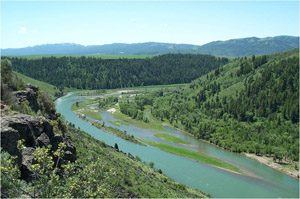Why the federal budget bill could devastate conservation and what you can do about it
 Policy,
Policy,  Preservation
Preservation When the newly elected House of Representatives passed the FY2011 Federal Budget bill, the cuts to programs protecting the nation's natural resources were so dramatic that they dealt a potentially devastating blow to conservation work in the U.S.
According to the Alan Rowsome, funding policy director for the Wilderness Society, "The bill makes historically draconian cuts in many places. It eviscerates programs off the books."
Opponents to the cuts argue that the bill, if signed into law, will have wide-reaching negative impacts on wildlife habitat, the outdoor recreation industry, rural tourism-based economies, and the numerous environmental services that healthy ecosystems provide.
Why the Budget Bill’s Funding Cuts would Devastate Conservation
 A working ranch protected by conservation easement along the Snake River in Idaho. One of thousands of properties protected with Land and Water Conservation Funding.The budget bill drastically cuts funding to conservation programs across the board – the National Wildlife Federation provides an excellent overview of the carnage. Below I provide a few examples of some of the most egregious cuts:
A working ranch protected by conservation easement along the Snake River in Idaho. One of thousands of properties protected with Land and Water Conservation Funding.The budget bill drastically cuts funding to conservation programs across the board – the National Wildlife Federation provides an excellent overview of the carnage. Below I provide a few examples of some of the most egregious cuts:
The budget bill would slash $393 million funding to the Land and Water Conservation Fund – a 90% decrease to the nation’s premier conservation program. Created in 1964, the fund spends a small percentage of offshore drilling fees to provide matching grants to states and local communities to protect wildlife habitat, recreation areas, and historical sites.
Even though the fund was created with the authorization to spend up to $900 million in collected fees, congress has never released the full funding, and if the newly elected House has its way, the program will be whittled down to almost nothing. (Find out more information about how to fight for restoring full funding to the Land and Water Conservation Fund)
In a similar vein, the bill would eliminate funding for a number of wildlife, wetland, and forest conservation programs. For example, the bill would kill the $90 million State and Tribal Wildlife program, which proactively protects at-risk wildlife species before they require legal protection under the Endangered Species Act. The North American Wetlands Conservation Fund and the Forest Legacy Program would suffer a similar fate.
Major projects to restore our nation’s waters would also see massive cuts. The budget would slash by 45% - $280 million – historic efforts to restore the Great Lakes, Chesapeake Bay, Puget Sound, San Francisco Bay, Long Island Sound, Lake Champlain, and our nation's estuaries.
Unfortunately these cuts will have much greater significance than the nominal dollars. In most cases, the affected programs involve a funding partnership between private, state, and federal sources. Without a relatively small amount of federal funding to leverage state and private sources, projects to protect and restore our nation’s natural resources will die or be pushed back years, while parks and reserves from the local to the federal level will close.
So What Can the Conservation Community Do About It?
The funding cuts have spurred outcry from a diverse array of sources including the nation’s leading conservation organizations and hunter and angler groups. The Outdoor Industry Association representing companies such as REI and North Face is organizing its members to influence Congress. Leading conservation organizations like the Nature Conservancy and the Wilderness Society have unleashed an intense lobbying effort.
Yet with so many programs – from healthcare to education to the environment – facing the chopping block, the outlook for conservation remains grim. So what exactly can citizens who care about conservation do to affect the outcome?
“As long as representatives think this is a DC game about funding levels and that people at home don't care about, we will lose” according to Rowsome.
In other words, people at the local level need to organize and make noise, so that representatives understand that these cuts will affect local resources that their constituents care about and the voters will not forget. This means writing letters to local newspapers, making phone calls, attending town hall meetings, organizing protests – becoming a pain in the ass.
In the grand scheme of things, the savings from eliminating conservation programs are inconsequentially small relative to the deficit the country faces while much larger potential targets such as subsidies for oil and gas drilling emerged from the House budget unscathed.
This indicates that the cuts to conservation are more about ideological opposition than a sincere interest in fiscal responsibility. In this regard, the voice of local citizens can send legislators a powerful counterbalancing message - that the voters do indeed care about conservation and they are watching this Beltway poker game very closely.
Republished from the Conservation Job Spot
--Rob Goldstein is a writer for the blogs Conservation Job Spot and Conservation Maven. He also runs of the Conservation Job Board, a source for Wildlife, Forestry, and Ecology Jobs. The author grants permission for this article to be fully or partially republished provided that this source attribution is included as written here.




Reader Comments